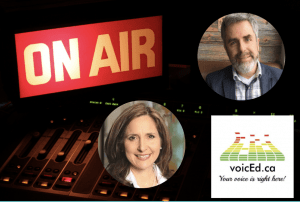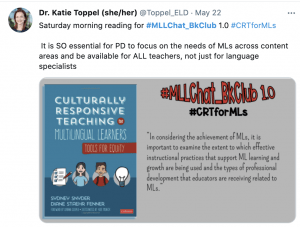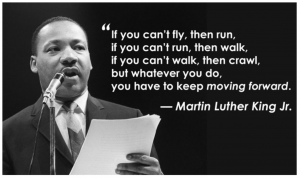In this show, Stephen Hurley and I reflect on the labels we use to describe our language learners and we end up sharing some practical ways to foster HOPE for our students & our staff.
You can read about it below, listen on your favorite podcast app or tune in right here:
Listen to “BAP094 Hope with Agency & Shifting to an Asset Lens” on Spreaker.
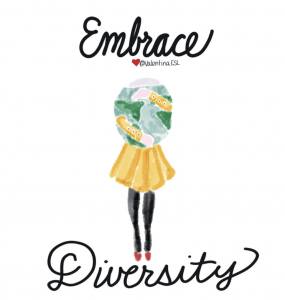 Many people in our field are making a conscious effort to describe students with terms such as “Multilingual Learners” or “Culturally & Linguistically Diverse Learners.”
Many people in our field are making a conscious effort to describe students with terms such as “Multilingual Learners” or “Culturally & Linguistically Diverse Learners.”
I am on board with this 100%! But I am still on a very public journey of learning and still exploring this for myself. That journey is sometimes uncomfortable but I mention Brene Brown’s work on vulnerability as we are reflecting. Her work on ‘putting yourself out there’ has made an incredible difference in my life.
Stephen offers me a T. S. Elliot Quote that sums up the way I often feel about what we do and our learning journeys:
We shall not cease from exploration, and the end of all our exploring will be to arrive at where we started, and know the place for the first time. – T.S. Elliot
I still use the term “EL” and “ELL” when working with clients but I want to use different language when it is not necessary to be specific about students who are receiving services.
In fact, Dr. Katie Toppel, Tan Huynh, and I recently authored a book where we make sure to limit the use of the term “EL.” As I speak to Stephen, you’ll hear me talk about the term “CLD” or “Culturally and Linguistically Diverse” students. Katie, Tan & I know we want to use something other than EL when we refer to the students we serve, but we are still debating the right term to use.
It’s great to see that things are changing and more people are adopting asset terms to describe our diverse students. The current round of #MLLchat_BkClub (formerly #ELLchat_BkClub) is studying a fabulous book by Diane Staher Fenner & Sidney Snyder. Notice the term being used to describe the students.
I feel strongly that we need to describe our students and refer to them in ways that reinforce all that they bring. But I do worry about the confusion that can happen when we are not clear about who needs services, who needs what scaffolds, who we are advocating for.
Let’s be Clear.. AND Asset-Based
I work with districts and I am hired to help educators not only accelerate language acquisition but also to support SLIFE & other ELs access grade-level content. That requires that we are clear about which demographics and subpopulations we are referring to.
But I think we can do this. I feel that I can walk into a school and talk about ELs & SLIFE in terms of what we can do to support them. In the same conversation, I can marvel at how wonderful the support is for all the Multilingual Learners. I can tell a student that it is exciting to see them grow as a bilingual scholar. I can assess the environment and talk about how inviting it is or isn’t for a culturally and linguistically diverse community.
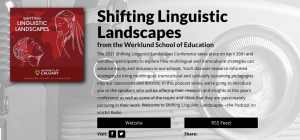 In our live conversation, Stephen Hurley makes a good point that new terminology is always changing based on research and based on our perspective of the world. He talks about the intersection of multilingualism, cultural diversity and linguistic diversity. I think he is right… it is a complex place to be.
In our live conversation, Stephen Hurley makes a good point that new terminology is always changing based on research and based on our perspective of the world. He talks about the intersection of multilingualism, cultural diversity and linguistic diversity. I think he is right… it is a complex place to be.
Some of Stephen’s Journey
Speaking of perspective, Stephen talks about how his own perspective was changed when he began interviewing speakers for the Shifting Linguistic Landscapes conference. You can hear a great deal of it for free right here on VoicEd.ca
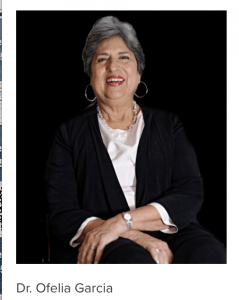 I highly recommend you check out that series. You’ll get an opportunity to hear more about Translanguaging from the keynote Dr. Ofelia Garcia as well as other leaders in the field.
I highly recommend you check out that series. You’ll get an opportunity to hear more about Translanguaging from the keynote Dr. Ofelia Garcia as well as other leaders in the field.
Stephen Hurley (who happens to be the founder of VoicEd radio) is constantly learning. He speaks in this chat about the fact that embracing diversity in your classroom brings an opportunity to invite new perspectives. YES! His thoughts around that are wonderful to hear and great for our reflection.
Multiple Perspectives
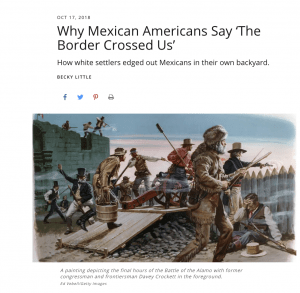 As we discussed multiple perspectives, I told an anecdote of a newcomer who furthered everyone’s language and literacy by recounting how the history of the Texas-Mexico war was taught to him in his country.
As we discussed multiple perspectives, I told an anecdote of a newcomer who furthered everyone’s language and literacy by recounting how the history of the Texas-Mexico war was taught to him in his country.
I mention how much language we get off the ground when we have engaging conversations and even debates. I always ask students to use language such as:
“I see what you are saying, but have you considered…?”
“That is an interesting point of view. From my perspective…”
“I agree that…”
“Tell me more about…”
But for these kinds of highly engaging discussions, the classroom needs to be a safe and respectful environment for everyone.
I talk to Stephen about one of the practical things I do in my classroom to achieve this. We always set up a social contract. The steps I use are from Capturing Kids’ Hearts, a program/training that some of my colleagues had received. I write and talk about it here.
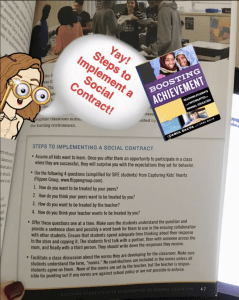
I also shared my thoughts around supporting teachers who are burned out and having a difficult year. I don’t believe the answer is to give up and think that the teacher can’t benefit from coaching or training right now. Yes, many are in a high-stress place, and many are overwhelmed and their work is so difficult. But that is the reality for the students that we serve. The answer is not to say, “you don’t need support.” The answer is to create a low-stress environment where people are having wins… where their voice is valued, and where we are all learning. Administrators that work to create this atmosphere are modeling what we can do for our MLLs
HOPE 💫
Before we wrapped up we got on the topic of what gives people hope right now. Hope is the answer for teachers who are burned out, students who are going through difficult circumstances, even ourselves and our families.
We all need hope and, lucky for us, EDUCATION offers so much hope. Stephen made connections to the sense of agency around Hope. He mentions a book by Thomas Homer-Dixon entitled Comanding Hope.
Stephen goes on to point out the difference when we say
“I hope that…” (a wish)
and
“I hope to…” (now we have agency!)
In these challenging times, I will continue to try to offer hope to as many students, educators and education leaders as possbile. But as Stephen says, I want to offer hope that comes with a sense of agency, not just a wish.
It reminded me of a quote that our newcomers memorized. It can give students a LOT of hope… with agency!
So at the end of the day, I am still doing the work of being as asset minded as I can for our students. You’ll likely contine to hear me fumble through different ways of describing our students and I appreciate your grace in that. I’m working on what sounds right and feels right for different circumstances.
I’d love to hear what you think about the terms and how it is affecting your world. Please comment here or find me on Twitter or Facebook let me know!
Thanks for
